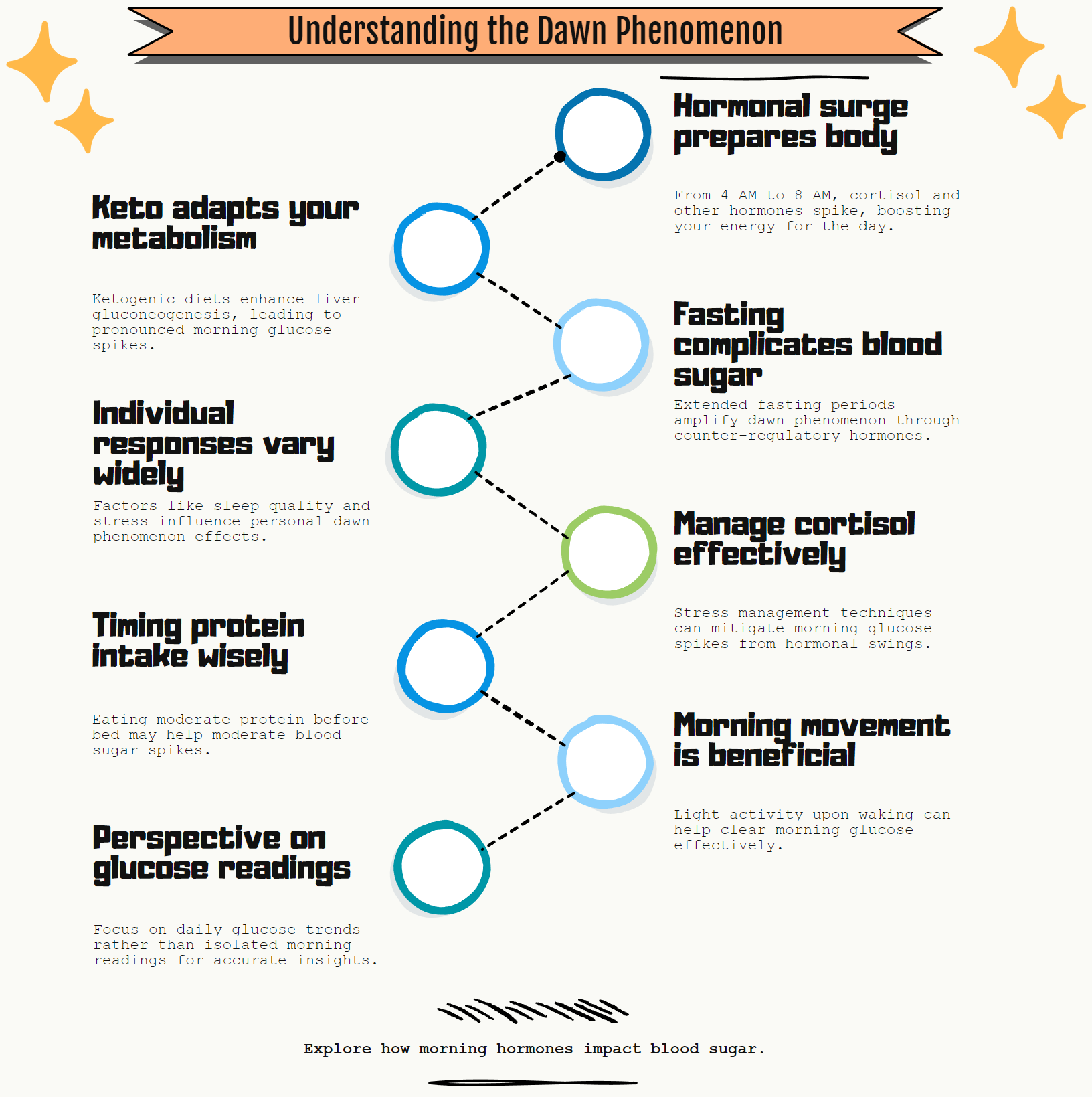
Why Your Morning Blood Sugar Spikes Despite Perfect Eating
Why Your Morning Blood Sugar Spikes Despite Perfect Eating
Your body betrays you at dawn.
You've followed your keto plan flawlessly. Or perhaps you've maintained that 16-hour fast with military precision. Yet somehow, your morning blood glucose reading sits stubbornly high, mocking your efforts and confusing you.
This counterintuitive blood sugar spike has a name. The dawn phenomenon represents one of the most misunderstood aspects of metabolic health, especially for those navigating the waters of ketogenic eating and intermittent fasting.
Let's untangle this biological puzzle and reveal why your body works against you during those early morning hours.
The Biological Alarm Clock You Never Set
Between approximately 4:00 AM and 8:00 AM, your body orchestrates a complex hormonal cascade to prepare you for waking. This evolutionary adaptation served our ancestors well, ensuring adequate energy availability to prepare them for hunting or gathering.
What happens physiologically? Your body releases a surge of cortisol, growth hormone, and catecholamines. These hormones trigger your liver to dump glucose into your bloodstream through glycogenolysis (breaking down stored glycogen) and gluconeogenesis (creating glucose from non-carbohydrate sources).
The result? Blood sugar levels that rise by 10-20% even when you haven't consumed a single calorie.
When Keto Meets Morning Hormones
The ketogenic state creates a fascinating metabolic context for the dawn phenomenon. When fully fat-adapted, your body primarily runs on ketones rather than glucose. This metabolic shift changes how your system handles the morning hormone surge.
Contrary to what many assume, keto practitioners often experience a more pronounced dawn effect, not less. Why? Your liver becomes exceptionally efficient at gluconeogenesis when adapted to ketosis. The metabolic machinery that helps you thrive without carbohydrates also ensures your liver can rapidly produce glucose when signaled by morning hormones.
Additionally, the insulin resistance naturally occurring during sleep becomes slightly more pronounced in keto-adapted individuals, temporarily reducing your cells' ability to clear that morning glucose spike.
Fasting Amplifies The Signal
Intermittent fasting introduces another layer of complexity. Extended fasting periods, particularly those that run through the night and into the morning, create a perfect storm for expressing the dawn phenomenon.
During prolonged fasting, your body relies on counter-regulatory hormones like glucagon, cortisol, and growth hormone to maintain energy homeostasis. These same hormones directly contribute to the dawn phenomenon.
The longer your fast extends into morning hours, the more pronounced this effect often becomes. Your 16:8 or 18:6 fasting protocol might amplify rather than mitigate your morning glucose excursion.
Not All Dawn Phenomena Are Created Equal
Individual responses to this morning's glucose surge vary dramatically. Factors influencing your personal dawn phenomenon include:
Sleep quality plays a crucial role. Poor sleep amplifies cortisol response, potentially worsening morning blood sugar spikes. One study found that a single night of sleep deprivation can increase morning glucose by 15%.
Stress levels directly impact your hormonal cascade. Chronic stress creates a baseline elevation in cortisol that can make the dawn phenomenon more pronounced.
Liver glycogen status matters significantly. Paradoxically, low liver glycogen can trigger a stronger counter-regulatory hormone response, potentially increasing gluconeogenesis.
Age and metabolic health history influence your cellular insulin sensitivity. Those with longstanding insulin resistance often experience more dramatic morning spikes.
Breaking The Dawn Code
Understanding that the dawn phenomenon represents normal physiology rather than failure provides the first step toward working with your body rather than against it.
Strategic approaches to managing this natural process include:
Protein timing experiments can yield interesting results. Some find that moderate protein consumption before bed provides amino acid substrates for overnight gluconeogenesis, creating a more gradual rise than a sudden morning spike.
Movement upon waking helps clear glucose through non-insulin-dependent pathways. Even ten minutes of light activity can significantly blunt the peak of your dawn phenomenon.
Stress management techniques like meditation or deep breathing before bed and upon waking may moderate the cortisol response, driving part of the morning glucose elevation.
Breaking your fast strategically might mean adjusting your eating window to start earlier if you're particularly sensitive to the dawn phenomenon.
Beyond The Numbers Game
Perhaps the most critical insight regarding the dawn phenomenon involves perspective. This natural process reflects your body's evolutionary wisdom rather than metabolic malfunction.
The transient morning glucose elevation poses no significant metabolic threat for most healthy individuals following ketogenic or intermittent fasting protocols. The area under your daily glucose exposure curve matters far more than an isolated morning reading.
The dawn phenomenon reminds us that metabolic health exists as a dynamic, fluctuating system rather than a static set of numbers. Your body operates on rhythms and cycles that sometimes appear counterintuitive when viewed through the narrow lens of a single measurement.
Rather than fighting against this natural process, successful keto and fasting practitioners learn to incorporate this understanding into their broader metabolic approach.
The Sunrise Perspective
Your morning blood sugar represents just one data point in a complex metabolic symphony. While sometimes frustrating, the dawn phenomenon offers a window into how exquisitely your body maintains energy homeostasis even during extended fasting or carbohydrate restriction.
By understanding the mechanisms behind this natural process, you can eliminate unnecessary worry about morning readings while developing strategies that work with your body's innate rhythms rather than against them.
The next time your morning glucose meter shows numbers higher than expected, remember that sometimes what appears as metabolic rebellion represents ancient biological wisdom at work.
